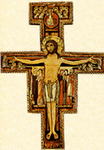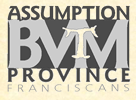Lord, do you intend to wash my feet, too?
 This question posed by St. Peter at the Last Supper according to the Gospel of John (chapter 13) really can be a focus for us, especially in the West.
This question posed by St. Peter at the Last Supper according to the Gospel of John (chapter 13) really can be a focus for us, especially in the West.
Icon of Jesus washing the discples' feet at the Last Supper
Will we allow the Lord Jesus to wash our feet? According to Middle Eastern tradition it was the role of the slave or servant to undertake this seemingly distasteful task. Jesus the Master become Jesus the Servant. And then later on in the Last Supper discourse (chapter 14) he tells his disciples that he considers them to be his friends and no longer slaves.
We have become familiar with the symbolic use of feet in the Middle East, especially since the US military involvement in Iraq. Perhaps this takes on even a more profound meaning for us. Whether it was beating the fallen statue of Sadaam Hussein with the soles of shoes, or the angry Iraqi people insulting US soldiers by showing the bottoms of their feet or the reporter throwing both of his shoes at former President Bush in Baghdad, the Middle Eastern attitude toward displaying feet is understood as a negative act.
Jesus willingly takes on a distateful ritual reserved to the lowest members of the household in preparation for undergoing the ignominious "ritual" of Roman crucifixion. And he teaches his disciples to do the same! Tonight at the Roman Rite Mass of the Lord's Supper the priest will wash the feet of members of the congregation. It seems that whenever folks are asked to have their feet washed in this solemn ceremony they are quite reluctant to do so. There is an unease, an embarrassment about this public display of humility and even affection.
Tonight at the Roman Rite Mass of the Lord's Supper the priest will wash the feet of members of the congregation. It seems that whenever folks are asked to have their feet washed in this solemn ceremony they are quite reluctant to do so. There is an unease, an embarrassment about this public display of humility and even affection.
Franciscan priest kissing a parishioner's foot after having washed it
And perhaps that is exactly where we need to be -- just a bit uncomfortable! Peter was aghast that his Lord and Master would literally stoop to this act. It was, quite frankly, shocking. And then to be instructed that this is how the disciples are to relate to one another -- washing one another's feet! Not just as a ritual act but as a symbol of loving one another as Jesus has himself loved us.
As Franciscan friars we see this as our life, our vocation. It is not only in imitation of the Lord Jesus. Even more so, it is allowing Jesus Christ, risen from the dead, to animate us to live, act and behave in his name. From the time of St. Francis of Assisi's remarkable humilty in caring for lepers and also for his brothers, the Franciscans have attempted to undertake this task in cheerful love, especially among the poor, the forgotten, the isolated and the marginalized.
The Mass of the Lord's Supper, which concludes with the solemn transfer of the Holy Eucharist to the Altar of Repose, leads us to prepare for the Lord's Passion. I would like to encourage any who read this blog to take the time, whether at your parish church or at home, and continue the Gospel of John from the conclusion of the this evening's Gospel (John 13:1-15), beginning with verse 16 and continuing slowly through the following chapters of the Gospel -- 14, 15, 16 and 17 -- often called the Last Supper Discourse (that is, teaching) of Jesus.
Powerful messages for us as we enter into this Sacred Triduum -- loving one another as Jesus loves us, the promise of the outpouring of the Holy Spirit, the encouragement for perseverence under trial and the famous prayer of Jesus for the unity of his disciples. And more, of course.
The Agony of the Lord Jesus in the Garden of Gesthemani
Jesus washing the discples' feet leads to his own feet being crucified on Good Friday. He does this for you and for me, indeed, for the whole world.
His washing eventually transforms his disciples. If you will, it is a kind of "baptism" in which they are changed by their Master. It leads us to have the attitude of Jesus (cf. Phil. 2:1-11). The same love and compassion, the same strength and grace, the same trust in his Abba, Father (see Rom. 8:14-17).
He wants to wash your feet. Today. Now. Will you let him?
Come, Lord, and wash my feet, too. Deliver me from sin and from my own selfishness. Change my heart that I may trust you with all things in every circumstance in my life. Bring salvation, Lord Jesus, as you wash my feet even now. Lead me through these holy days of the Triduum into the victory (yes, victory!) of your Cross and Resurrection. Lord, by your Cross and Resurrection you have set me free -- you have set us free -- you are the Savior of the world. Thank you. Amen.




